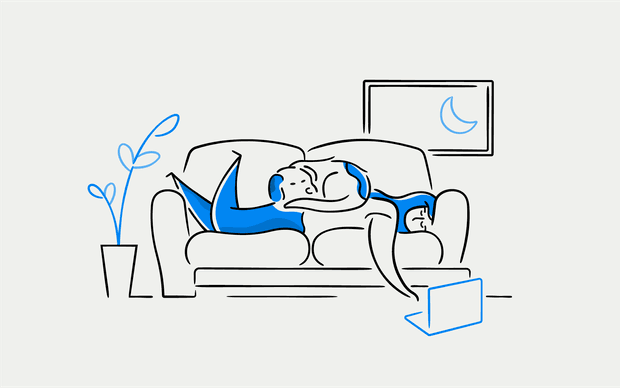With the sun in the sky for barely eight hours on the shortest day of the year, lunchtime is often the only chance that UK workers have to get out in the daylight.
But with the typical lunch break lasting only 30 minutes, it’s easy to see why one in five UK adults is reported as not getting enough vitamin D during the winter months.
Going long stretches of time without adequate sunlight isn’t without its consequences. Together with fatigue, mood swings, and depression, vitamin D deficiency can also result in reduced productivity at work.
Fortunately, there are plenty of simple ways that managers can ensure their employees get the sunlight they need to keep their spirits up and their bodies healthy — even here in drizzly old Britain.
Due to the impact of covid-19, we’ve taken care to only list tips that can be applied to remote-working teams and when social distancing. Please stick to local restrictions and guidelines.
1. Educate staff about Seasonal Affective Disorder (SAD) & vitamin D deficiency
SAD is a form of seasonal depression that usually worsens significantly in winter. It's a step beyond the usual 'winter blues' that most of us experience – those with SAD experience some or all of the typical symptoms of depression, such as a persistent low mood, and a loss of interest in things they'd usually enjoy.
They might also feel tired or sleepy during the day, be unable to focus, and sleep longer than usual. As a result, their performance at work might be affected.
Educate staff to spot the signs of SAD, and offer self-care tips like encouraging lunchtime walks and eating a balanced diet. You should also try to maximise the amount of natural light in the workplace, and consider moving employees affected by SAD to desks nearest the windows.
Similarly, vitamin D deficiency is a particular problem in the winter months – UK sunlight isn't strong enough between October and March for our bodies to produce vitamin D, so we rely on getting it from food and supplements. In fact, the NHS recommends that all UK adults take vitamin D supplements during the winter. Vitamin D deficiency can cause fatigue and weaken your immune system, so it's important that staff are made aware of its role in staying healthy, particularly during winter.
This could be via a company-wide memo, a few minutes spent discussing it during a morning standup, or simply sending out an email containing a link to a reputable source providing information.
It doesn’t really matter how you bring this issue to your team’s attention, just so long as they know that there’s a lot more to vitamin D deficiency and SAD than feeling a bit sluggish.
2. Let your staff work flexibly
During the winter, a large number of full-time employees start their day while it’s still dark. By the time they finish for the day, the sun has long since slipped over the horizon.
But by letting staff juggle their hours a little, it'll be much easier for them to get outdoors while the sun is (hopefully!) still shining.
If your staff starting and finishing their day at completely different times would be problematic for your business, consider staggered starts instead.
The work patterns you create don't have to be vastly different; at RotaCloud, we have some staff working 9–5 as normal, others who start at 10am, and a bunch of early-birds who work 7–3. Just be sure you have all your bases covered and have some kind of system in place so people know when their teammates are available.
3. Encourage staff to take annual leave
Time off might not be the first thing on employees’ minds after coming back from their Christmas or New Year break, but a couple of days off during the darker months can work wonders for their health.
Managers know by now the importance of encouraging their staff to take annual leave rather than storing it all up. But the months of January and February are easily the most overlooked when it comes to taking time off, which only adds to the problem of employees feeling low or burnt out during winter.
Talk to your staff about the importance of getting outdoors while the days are so short, and remind them that their annual leave allowance is there for a reason.
4. Introduce ‘light lunches’
Another way to give your staff a chance to get outside in the daylight is to introduce the option of taking slightly longer lunches during winter.
At RotaCloud, we recently introduced something called ‘light lunches’, where staff are free to take a two-hour lunch break up to twice a week during January and February. Staff aren’t required to make up the extra hours, and breaks are paid.
So far, the initiative has been a big success, with staff using their longer lunch periods to enjoy cycling, walks along the river, and even lunch in the park while the sun is shining — things they wouldn’t have been able to do with a normal-length break — and return to work in the afternoon feeling that bit more upbeat and energised.
5. Promote outdoor exercise groups*
Time spent outside is great, but time spent outside with friends is better.
Another way to encourage staff to spend time outdoors, as well as helping teams to bond, is to set up walking, running, or cycling groups within your company. These could be organised via a group Slack channel, a WhatsApp group, or even a private Facebook page — it doesn’t matter so long as you create the opportunities for your staff to get outdoors together.
Sure, we could all exercise alone, but we’re far more likely to get outside and break a sweat if we know that others are expecting us!
If running or cycling as a group isn't currently an option, you can always start a club or group on something like Strava to see who's putting in the most miles each week and encourage some friendly competition!

*Where local coronavirus guidelines allow it!
6. Promote better rest
It’s important that your staff know how to unwind so that they can get the best possible sleep at the end of each day and start the next feeling refreshed.
Here at RotaCloud, we’ve taken to running lunchtime yoga sessions online during lockdown, and have even invited guest speakers to talk to the team about the importance of good quality sleep and techniques for unwinding at the end of the day.
Teaching your staff how to rest well can be just as beneficial to their productivity as setting them goals and upgrading their laptops, so don’t be shy about investing in it.
7. Stay social after hours
Winter wellbeing isn’t just about getting enough sunlight; it’s also about socialising and keeping morale high.
We might not be able to mingle after work like we once did (whether that’s because of covid or the simple fact that the nights are so dark and cold), but your staff should be encouraged to socialise online after work wherever possible.
Post-work Zoom drinks, online games nights, or perhaps even an online escape room tackled as a team are all great ways to have fun, socialise, and let off steam, even when we're stuck indoors.
8. Check in with employees proactively
All too often, managers or HR only speak to employees when it’s obvious that something’s not right — sometimes in a disciplinary meeting when they’re asked to explain their high levels of absence, lateness or lack of productivity or engagement.
This winter especially, we’re all struggling to some extent — and there’s a good chance every single employee will appreciate a friendly call to see how they’re getting on, and if there’s anything the business can do to support them.
There’s no need to make the chat just about work. Keep it informal, be supportive, and make sure you speak to everyone — not just the staff you know are struggling.
By taking the time to talk to employees before any problems emerge, it’ll help keep your business running smoothly, and support employee wellbeing, too.
Bonus tip: Be more lenient
We’ve left this point until last because it feels particularly pertinent at the moment, what with the pandemic compounding the usual winter weariness.
Where possible, and without causing any health or safety issues, consider relaxing some of the rules that employees often fall foul of. For example, you might want to apply more leniency when an employee is late, or let staff book time off with less notice than you’d usually ask for.
Similarly, don’t stress about staff taking more short breaks during their shifts — in fact, it might be a good idea to encourage it!
Remember: we’re in a pandemic, everyone is more stressed than they usually are. Bear that in mind through this winter. It's more important than ever to pay attention to staff wellbeing.







